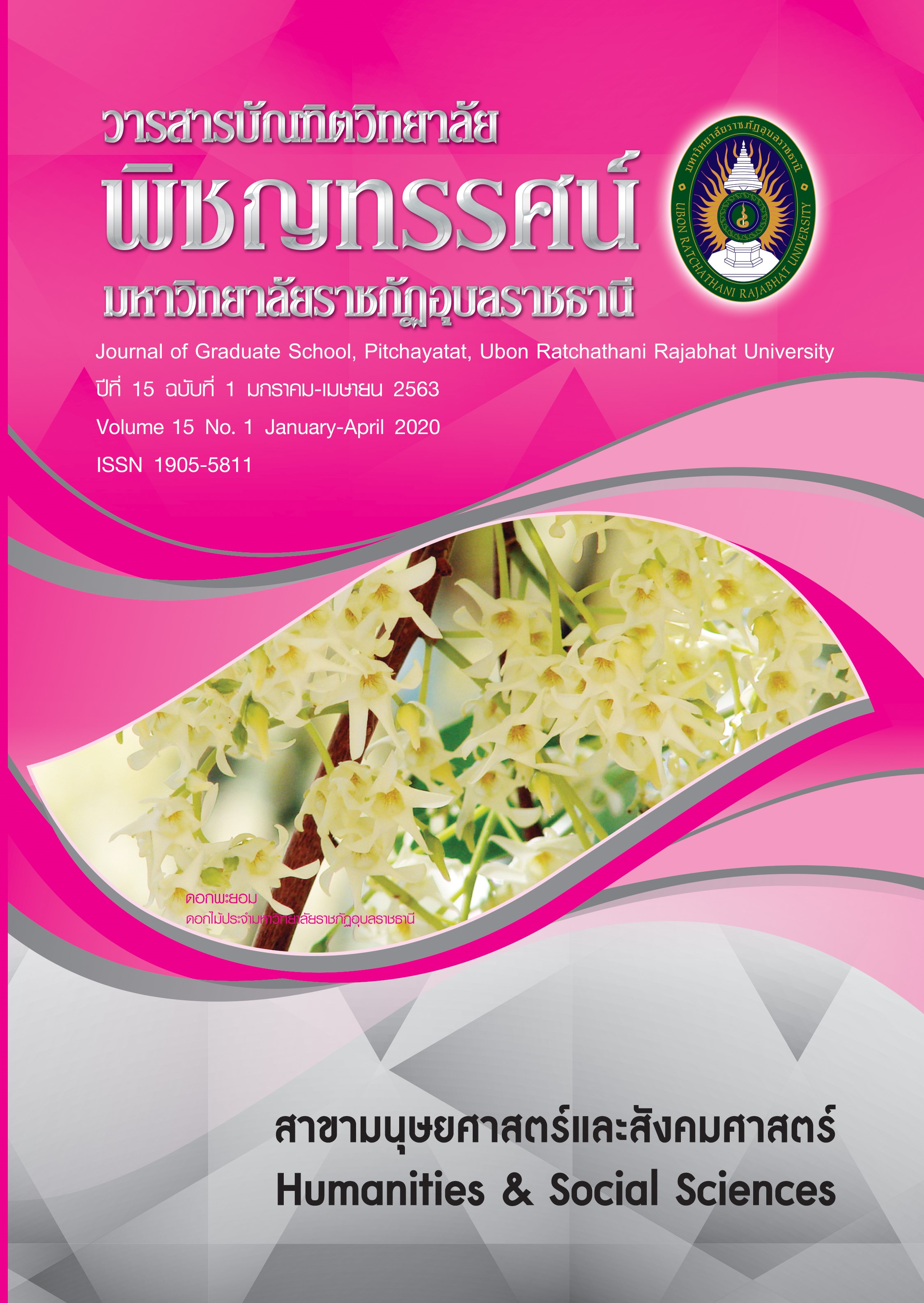ผลของการเรียนแบบสะท้อนคิดโดยใช้แผนผังความคิดออนไลน์แบบมีโครงสร้างและแบบอิสระ ที่ส่งผลต่อความสามารถในการคิดอย่างมีวิจารณญาณของนักศึกษาระดับปริญญาตรี ที่มีรูปแบบการเรียนต่างกัน
คำสำคัญ:
การเรียนแบบสะท้อนคิด, ความสามารถในการคิดอย่างมีวิจารณญาณ, รูปแบบการเรียนบทคัดย่อ
การวิจัยมีวัตถุประสงค์ เพื่อศึกษาผลของการเรียนแบบสะท้อนคิดโดยใช้แผนผังความคิดออนไลน์แบบมีโครงสร้างและแบบอิสระที่ส่งผลต่อความสามารถในการคิดอย่างมีวิจารณญาณของนักศึกษาระดับปริญญาตรีที่มีรูปแบบการเรียนต่างกัน ตัวอย่างคือ นักศึกษาระดับปริญญาตรี สาขาวิชาคอมพิวเตอร์ มหาวิทยาลัยราชภัฏสุรินทร์ จำนวน 120 คน ได้มาโดยวิธีการสุ่มแบบจับคู่ เครื่องมือที่ใช้ในการวิจัย คือ การเรียนแบบสะท้อนคิดที่มีรูปแบบต่างกัน แบบทดสอบวัดความสามารถในการคิดอย่างมีวิจารณญาณ สถิติที่ใช้ได้แก่ ค่าเฉลี่ย ส่วนเบี่ยงเบนมาตรฐาน และการวิเคราะห์ความแปรปรวนแบบสองทาง
ผลการวิจัยพบว่า
- ผู้เรียนที่มีการเรียนแบบสะท้อนคิดโดยใช้แผนผังความคิดออนไลน์แบบมีโครงสร้างมีคะแนนความสามารถในการคิดอย่างมีวิจารณญาณสูงกว่าผู้เรียนที่มีการเรียนแบบสะท้อนคิดโดยใช้แผนผังความคิดออนไลน์แบบอิสระอย่างมีนัยสำคัญที่ระดับ .05
- ผู้เรียนที่มีรูปแบบการเรียนต่างกันเมื่อได้รับการเรียนแบบสะท้อนคิดโดยใช้แผนผังออนไลน์ต่างกันมี
คะแนนความสามารถในการคิดอย่างมีวิจารณญาณต่างกันอย่างมีนัยสำคัญที่ระดับ .05
- ไม่มีปฏิสัมพันธ์ระหว่างรูปแบบการเรียนต่างกันที่ได้รับการการเรียนแบบสะท้อนคิดโดยใช้แผนผัง
ออนไลน์ต่างกันมีคะแนนความสามารถในการคิดอย่างมีวิจารณญาณอย่างมีนัยสำคัญที่ระดับ .05
เอกสารอ้างอิง
จุฑาทิพย์ ชาติสุวรรณ. การสร้างแบบทดสอบวัดการคิดอย่างมีวิจารณญาณ. วิทยานิพนธ์การศึกษามหาบัณฑิต มหาวิทยาลัยมหาสารคาม, 2548.
ชำนาญ ด่านคำ. การพัฒนารูปแบบการเรียนสังคม เกมมิฟิเคชั่นออนไลน์เพื่อส่งเสริม พฤติกรรมการเรียนรู้และการคิดอย่างมีวิจารณญาณสำหรับนักศึกษาปริญญาตรี. วิทยานิพนธ์ครุศาสตรมหาบัณฑิต มหาวิทยาราชภัฏมหาสารคาม, 2560.
ธีรพล เพียรเพ็ง. ผลของการสะท้อนคิดด้วยวีดิทัศน์ตามแนวคิดวงจรกิบส์ในแฟ้มสะสมงานอิเล็กทรอนิกส์ ที่มีต่อระดับการสะท้อนคิดของนักศึกษาครู. วิทยานิพนธ์ครุศาสตรมหาบัณฑิต จุฬาลงกรณ์มหาวิทยาลัย, 2554.
นรีรัตน์ สร้อยศรี. การพัฒนารูปแบบการเรียนรู้แบบร่วมกันด้วยเว็บเควสท์เชิงสมรรถนะ (Competency-based Webquest) เพื่อพัฒนาการคิดอย่างมีวิจารณญาณสำหรับนักศึกษามหาวิทยาลัยเทคโนโลยีราชมงคลกรุงเทพ. ดุษฎีนิพนธ์ปรัชญาดุษฎีบัณฑิต มหาวิทยาลัยเทคโนโลยีพระจอมเกล้าพระนครเหนือ, 2553.
ประกอบ กรณีกิจ. การพัฒนารูปแบบแฟ้มสะสมงานอิเล็กทรอนิกส์โดยใช้การประเมินตนเองเพื่อส่งเสริมการคิดอย่างมีวิจารณญาณของนิสิตนักศึกษาฝึกประสบการณ์วิชาชีพครู. วิทยานิพนธ์ดุษฎีบัณฑิต จุฬาลงกรณ์มหาวิทยาลัย, 2550.
วัชรี แซงบุญเรือง. การพัฒนารูปแบบการเรียนรู้ที่ส่งเสริมการคิดอย่างมีวิจารณญาณภายใต้สภาพแวดล้อมทางการเรียนเสมือนจริงสาหรับนักศึกษาระดับปริญญาตรี. วิทยานิพนธ์ครุศาสตรมหาบัณฑิต มหาวิทยาลัยราชภัฏมหาสารคาม, 2559.
วาฤทธิ์ นวลนาง. ผลการเปรียบเทียบรูปแบบการสอนออนไลน์ตามกระบวนการ Big Six Model ที่มีต่อการรู้สารสนเทศและทักษะการแก้ปัญหาโดยใช้สารสนเทศของนักศึกษาปริญญาตรี มหาวิทยาลัยราชภัฏสุรินทร์ ที่มีรูปแบบการเรียนต่างกัน. วิทยานิพนธ์ครุศาสตรดุษฎีบัณฑิต มหาวิทยาลัยราชภัฏสุรินทร์, 2559.
สมนึก ภัททิยธนี และคณะ. การวัดผลการศึกษา. พิมพ์ครั้งที่ 7. กาฬสินธุ์: ประสานการพิมพ์, 2548.
อัจฉรา อินทร์น้อย. ผลการสอนโดยวิธีการจัดการเรียนรู้แบบแผนที่ความคิดที่มีผลต่อผลสัมฤทธิ์ทางการเรียนวิชาสังคมศึกษา ศาสนา และวัฒนธรรมของนักเรียนชั้นประถมศึกษาปีที่ 3. กรุงเทพฯ : มหาวิทยาลัยศรีนคริน ทรวิโรฒ, 2555.
Buzan, T. The Mind map book : Radiant thing. London: BBC Books, 1997.
Dewey, J. How We Think: A Restatement of the Relation of Reflective Thinking to the Educative Process. Boston, MA: D.C. Heath & Co Publishers, 1993.
Ennis, R., H. Logical basic of mesuring critical thinking skills. Journal of Education Leadership. 11, 4 (October 1985): 45-48.
Gibbs, G. Learning by Doing : A guide to teaching and learning methods. Further Educational Unit, Oxford Polytechnic, Oxford, 1988.
Giesen. Using Critical Thinking Teaching Methods to Increase Student Success: An Action Research Project. International Journal of Teaching and Learning in Higher Education 2017. 29, 1 (June 2011): 17-32.
Grasha, A., and Reichman, S. Work Handout on Learning Styles. Ohio: University of Cincinnati, 1982.
John. A. List. Field Experiments. The Journal of Economic Literature. 42, 4 (December 2004): 1009-1055.
Kolb. D.A. Experiential Learning Theory and The Learning Style Inventory: A Reply to Freedman and Stump. The Academy of Management Review. 6, 2 (April 1981): 289-296.
ดาวน์โหลด
เผยแพร่แล้ว
รูปแบบการอ้างอิง
ฉบับ
ประเภทบทความ
สัญญาอนุญาต
บทความทุกเรื่องได้รับการตรวจความถูกต้องทางวิชาการโดยผู้ทรงคุณวุฒิภายนอกอย่างน้อย 3 คน ความคิดเห็นในวารสารพิชญทรรศน์เป็นความคิดเห็นของผู้นิพนธ์มิใช่ความคิดเห็นของผู้จัดทำ จึงมิใช่ความรับผิดชอบของวารสารพิชญทรรศน์ และบทความในวารสารพิชญทรรศน์สงวนสิทธิ์ตามกฎหมายไทย การจะนำไปเผยแพร่ต้องได้รับอนุญาตเป็นลายลักษณ์อักษรจากกองบรรณาธิการ





